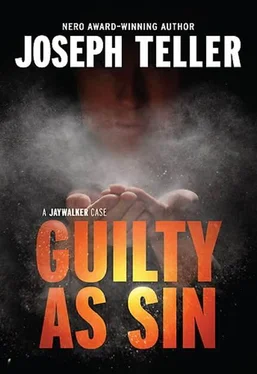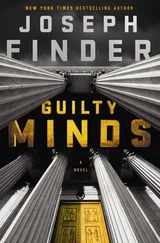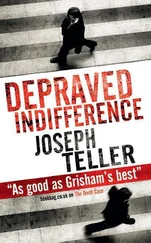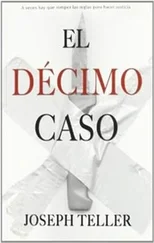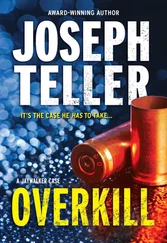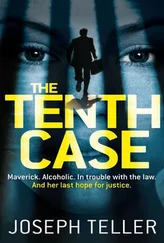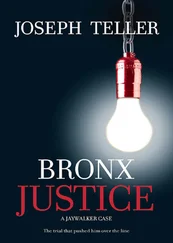Joseph Teller - Guilty As Sin
Здесь есть возможность читать онлайн «Joseph Teller - Guilty As Sin» весь текст электронной книги совершенно бесплатно (целиком полную версию без сокращений). В некоторых случаях можно слушать аудио, скачать через торрент в формате fb2 и присутствует краткое содержание. Жанр: Криминальный детектив, на английском языке. Описание произведения, (предисловие) а так же отзывы посетителей доступны на портале библиотеки ЛибКат.
- Название:Guilty As Sin
- Автор:
- Жанр:
- Год:неизвестен
- ISBN:нет данных
- Рейтинг книги:5 / 5. Голосов: 1
-
Избранное:Добавить в избранное
- Отзывы:
-
Ваша оценка:
- 100
- 1
- 2
- 3
- 4
- 5
Guilty As Sin: краткое содержание, описание и аннотация
Предлагаем к чтению аннотацию, описание, краткое содержание или предисловие (зависит от того, что написал сам автор книги «Guilty As Sin»). Если вы не нашли необходимую информацию о книге — напишите в комментариях, мы постараемся отыскать её.
Guilty As Sin — читать онлайн бесплатно полную книгу (весь текст) целиком
Ниже представлен текст книги, разбитый по страницам. Система сохранения места последней прочитанной страницы, позволяет с удобством читать онлайн бесплатно книгу «Guilty As Sin», без необходимости каждый раз заново искать на чём Вы остановились. Поставьте закладку, и сможете в любой момент перейти на страницу, на которой закончили чтение.
Интервал:
Закладка:
No, the morning’s most remarkable event wasn’t engineered by Jaywalker or Pulaski or Pascarella or Judge Levine or, for that matter, any combination of the four of them. Instead it was the spontaneous act of one young woman.
Just as Pulaski pulled his chair away from the table and was about to resume his seat next to her, Miki Shaughnessey rose to her feet, nodded at the judge, silently excused herself, turned and walked out of the courtroom.
To this day, Shaughnessey will demur when asked if her departure amounted to a sign of protest, a wordless objection to the way in which an experienced senior colleague had intimidated a witness into delivering answers that might or might not have been truthful. She’ll deflect the question and insist she retains little or no memory of the incident. She might not have felt well, she’ll tell you, or perhaps she’d experienced a sudden need to use the ladies’ room. And because she’d spoken not a single word at the time, who can possibly argue with her, especially now, after so many years have gone by?
Jaywalker can.
Because from his perfect vantage point, he’d needed no words. No sound track or subtitles could have made things any clearer to him. The expression on Miki Shaughnessey’s face as Pulaski neared her said it all. It was almost as though a stranger had approached her from across the room, and only when he’d reached her had it hit her that he hadn’t bothered to bathe, shower or brush his teeth in six months. It might not have been a literal stench emanating from Pulaski, but it was something very, very close. And whatever it was, Shaughnessey had suddenly reached her limit with him. Her expression told Jaywalker that she wanted nothing more to do with either Daniel Pulaski or the case he’d dropped into her lap a month earlier, then suddenly yanked back once the shit had begun to hit the fan. She was done with him and with the case, and though she’d show up to hear the summations, she’d listen to them from the audience section of the courtroom.
“Does the defense rest, Mr. Jaywalker?”
“No, Your Honor. I have one additional rebuttal witness. He’s here, and his direct testimony should only take a few minutes.”
“Are we going to be revealing the names of any informers?” she asked. “Or may we unbolt the doors and let the huddled masses in?”
“You may throw open the portals,” Jaywalker told her.
A court officer walked to the front door of the courtroom, unlocked it and pushed it open. Five or six people trickled in and found seats.
“The defense,” announced Jaywalker, “calls its final rebuttal witness, Alonzo Barnett.”
Until the moment Alonzo Barnett stood, none of the jurors had taken much notice of his changed wardrobe that Friday morning. A kufi-see yamika -tends to be worn toward the back of the head and is therefore barely visible from the front, especially when it’s a white kufi against gray-to-white hair. Even a long white robe looks a lot like a shirt when worn by a man sitting in an armchair pushed all the way up to the edge of a table for security reasons.
Now, as Barnett strode to the witness box-if indeed one can stride without hurrying-his appearance was suddenly riveting. Majestic wouldn’t be too strong a word to describe it, with his loose, knee-length white tunic, trimmed in pale blue. Regal might be closer to it.
As he sat, he carefully gathered his tunic around him. The court clerk reminded him that he was still under oath, but he needn’t have. Just to look at Barnett was enough to seriously doubt he was capable of telling anything but the absolute truth.
Or so Jaywalker hoped.
The judge spent a few minutes explaining the accommodations that had been made to the defendant out of respect for his day of observance. Then she nodded in Jaywalker’s direction.
JAYWALKER: Mr. Barnett, did you on three occasions obtain heroin for Agent Trevor St. James?
BARNETT: I did.
JAYWALKER: Why did you do that?
BARNETT: In order to repay a debt I felt I owed Clarence Hightower for having saved my life.
JAYWALKER: Would it be fair to say that Mr. Hightower induced and encouraged you to do what you did?
BARNETT: It’s more than fair to say. It’s what happened, over and over again. Until he finally pressed the right button and I said yes.
JAYWALKER: Had Mr. Barnett not induced and encouraged you over and over again, would you have done what you did?
BARNETT: Never.
And that was it.
Even as Jaywalker sat down, Daniel Pulaski waved a hand dismissively, his way of signaling the jury that Barnett’s assertions were so self-serving and meaningless that there was no need for Pulaski to cross-examine him.
THE COURT: Any further witnesses, Mr. Jaywalker?
JAYWALKER: No, Your Honor. The defense rests.
THE COURT: Mr. Pulaski?
PULASKI: The People rest, too.
And with that it was over, at least the evidence portion of the trial. The jurors were sent off for the weekend, some of them smiling at the prospect, others grumbling that their jury service would be going into its third week, more than they’d signed up for.
It was the grumblers who worried Jaywalker. They were the ones who were self-employed or considered themselves indispensable at work. They had small children, elderly parents or pets with bladder issues at home. Above all else, they wanted the case over with. Come deliberation time, their impatience could easily translate into a desire to arrive at a quick verdict, no matter which way it happened to go.
A quick verdict meant deciding whether the evidence proved beyond a reasonable doubt that the defendant had done what he was accused of doing. It left no room for nuance, no time to consider why he’d done it. Entrapment wasn’t a simple concept, a black-or-white, either-or notion that lent itself to quick and easy analysis. And that could spell trouble for the defense.
Big trouble.
Even as the jurors were excused for the weekend, the lawyers had to come back that afternoon for the charge conference, a meeting between the judge and the lawyers about what the judge will be telling the jurors when, following the summations, she instructs them on the principles of law applicable to the trial. Somewhere along the line, those instructions have come to be called the judge’s charge.
In most federal courts the lawyers are expected to submit detailed written requests to charge, often as early as the beginning of the trial. The practice in state court tends to be more relaxed, with oral requests being the norm. Nevertheless, Jaywalker took charge conferences seriously. What the judge told the jurors, and how she told it to them, was of critical importance. Juries don’t always get cases right, but it’s the rare jury that fails to take its job seriously. They listen to the judge and try to apply the principles of law to the facts, just as she tells them to.
A lot of any charge is boilerplate stuff. Presumption of innocence, burden of proof, credibility, reasonable doubt and unanimity of verdict don’t change from trial to trial. But some things do. And Alonzo Barnett’s case had several wrinkles that made it anything but ordinary.
So that afternoon, once Shirley Levine had run through a list of standard things she intended to tell the jurors, she called upon first Pulaski and then Jaywalker to make additional requests, if they had any. The setting was far more relaxed than it had been when the jury had been present, and the lawyers were permitted to remain seated at their respective tables while they spoke. But the court reporter was present, taking down every word of the discussion. More cases get reversed by appellate courts because of things said during the charge-or things requested but omitted from the charge-than because of just about anything else.
Читать дальшеИнтервал:
Закладка:
Похожие книги на «Guilty As Sin»
Представляем Вашему вниманию похожие книги на «Guilty As Sin» списком для выбора. Мы отобрали схожую по названию и смыслу литературу в надежде предоставить читателям больше вариантов отыскать новые, интересные, ещё непрочитанные произведения.
Обсуждение, отзывы о книге «Guilty As Sin» и просто собственные мнения читателей. Оставьте ваши комментарии, напишите, что Вы думаете о произведении, его смысле или главных героях. Укажите что конкретно понравилось, а что нет, и почему Вы так считаете.
